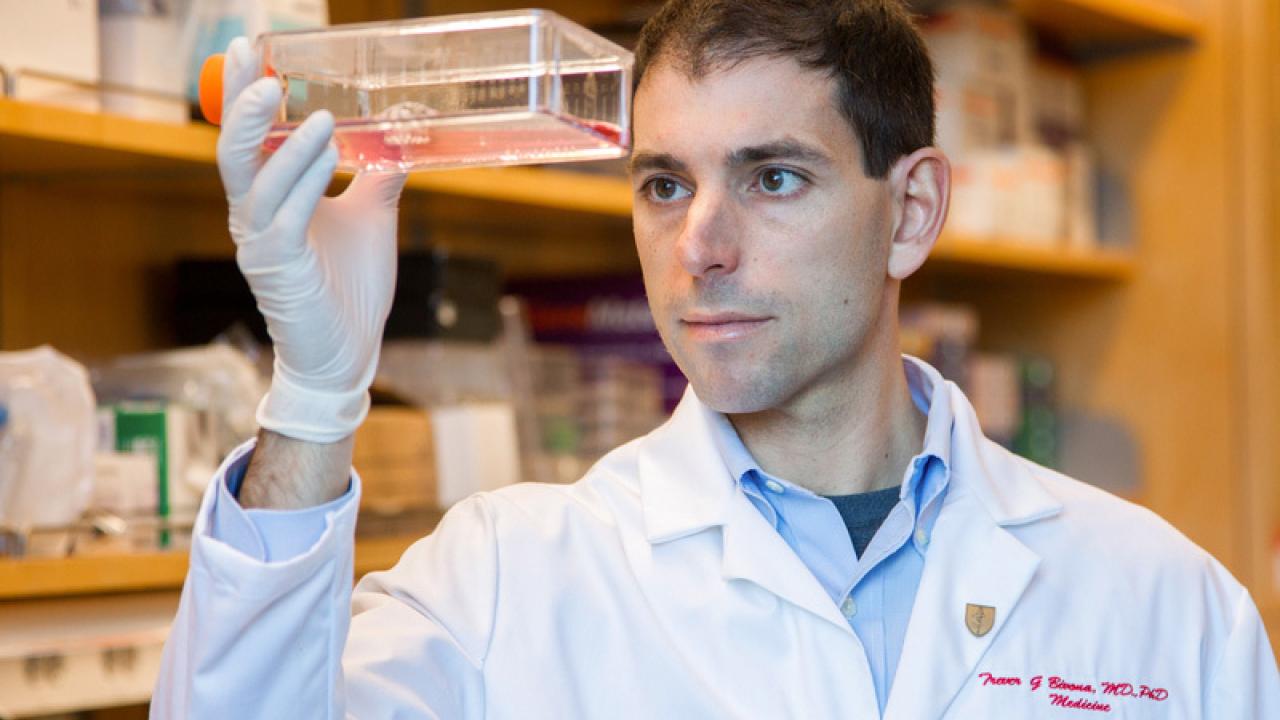
Trever Bivona, MD, PhD, associate professor in Hematology and Oncology, works on the mechanisms of resistance to targeted therapy in lung cancer. © Susan Merrell, 2015
The National Cancer Institute (NCI) has announced that UC San Francisco will host one of five new Cancer Drug Resistance and Sensitivity Centers being set up around the U.S. through funding from the 21st Century Cures Act of 2016.
The center, a collaboration with researchers at Stanford University School of Medicine, will receive more than $1 million per year for five years, with the aims of addressing the persistent challenge of drug resistance in lung cancer by better understanding its underlying biological mechanisms, and also developing new treatments that may overcome resistance.
The UCSF-Stanford center, called the Bay Area Team Against Resistance (BATAR), will be led by Trever Bivona, MD, PhD, an associate professor of medicine at UCSF who is a leading expert in the field of drug resistance, and Calvin Kuo, MD, PhD, the Maureen Lyles D’Ambrogio Professor of Medicine at Stanford University, a world expert on using lab-grown “organoids” derived from patients to test cancer drugs.
“Targeted therapies against different subtypes of cancer have become very effective at shrinking tumors, but in almost every patient, a small number of residual tumor cells that survive treatment will develop an ‘escape hatch’ that allows them to become resistant to treatment, and the tumor will grow again,” said Bivona, a member of the UCSF Helen Diller Family Comprehensive Cancer Center (HDFCCC). “It’s like we’re chasing our tails.”
“The purpose of our new center will be to focus specifically on why our current, powerful targeted drugs are not killing all of our patients’ cancers and to come up with new ways of preventing tumors from developing resistance,” added Kuo.
The UCSF-Stanford center will focus on lung cancer, which is one of the most common cancer subtypes in the U.S. — affecting one in every 15 Americans in their lifetime. Lung cancer is by far the leading cause of cancer death globally, causing one out of every four cancer deaths, more than colon, breast, and prostate cancers combined, according to statistics from the American Cancer Society. But partly due to unfounded prejudices about lung cancer and smoking, lung cancer has received less funding and research attention than other cancer subtypes, Bivona says, noting that 65 percent of lung cancer patients are non-smokers.
“Understanding the mechanisms of cancer drug resistance is vital if we are to make the best of existing and future targeted agents for cancer. This award builds on the work of outstanding researchers at UCSF and Stanford who will use novel technologies to move the field forward,” said Alan Ashworth, PhD, FRS, president of HDFCCC.
Bivona and Kuo’s team aims to get to the bottom of how lung cancers develop resistance to both targeted drugs and immunotherapy by taking biopsies from tumors throughout the typical course of treatment: at first diagnosis, at the point of maximum drug response, and as the tumor begins to develop resistance. By using multiple molecular profiling platforms, including single-cell RNA sequencing, to identify changes in gene expression in tumor cells at each of these time points the researchers hope to reveal which molecular changes trigger the evolution of drug resistance.
The team will then apply CRISPR/Cas9–based gene editing, computational pharmacology, and patient-derived organoid technologies — complex tissue-like structures derived from patient stem cells and grown in laboratory dishes — to screen for new drugs that could prevent the development of resistance.
“By understanding the evolutionary trajectories that allow tumor cells to develop resistance, we hope to learn how to combine multiple therapies to chase cancer cells into an evolutionary dead-end from which they can no longer escape,” Bivona said.
The center’s research team also plans to take blood samples from patients at each treatment time point to enable them to identify blood-borne biomarkers of drug response that identify early signs of resistance. If successful, this will enable physicians in the future to track treatment efficacy using simple blood draws — so-called “liquid biopsies” — a long-time goal currently being pursued by many major companies in the cancer therapy arena.